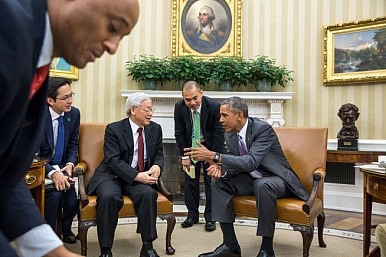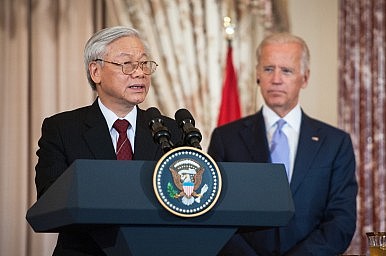Analysis: Successful leader in Vietnam needs to be faceless

By VIJAY JOSHI 12 hours ago

HANOI, Vietnam (AP) — Vietnam's latest political turnover made one thing abundantly clear: being a strong, charismatic leader with a high domestic and international profile will only lead to your downfall. To be successful in Vietnamese politics, you have to work with consensus — and be, for the most part, faceless.
Vietnam's Communist Party ended a weeklong congress on Wednesday sticking with the status quo by re-electing Nguyen Phu Trong as party general secretary, the country's No. 1 leader, for a second five-year term. A contender, reform-minded Prime Minister Nguyen Tan Dung, was cut to size and ousted from the collective leadership because he was seen by party bosses to have become too big for his boots.
Collective leadership is key to understanding how Vietnam's one-party Communist system works.
After Ho Chi Minh, the founding father of modern Vietnam, the party has studiously avoided cultivating a personality cult. Even Vo Nguyen Giap, a celebrated war hero, was never allowed the pedestal after he became a politician. All he got was a state funeral. Not even a statue or a bust or a portrait.
So no surprises that unlike China — its ideological ally where top leaders have been larger-than-life figures such as Mao Zedong, Deng Xiaoping and Xi Jinping — Vietnam prefers leaders who do not hog the limelight, and rule by consensus through a Politburo, the elite cream of the party.
Dung was anything but that.
"Dung was more charismatic, becoming a popular figure and generally seen to be becoming larger than the party, which did not go down well with the others who still have the old-fashioned notion that the country should be run by a faceless collective leadership," said Murray Hiebert, a Southeast Asian expert at a Washington, D.C., think tank.
So what does that partial change in leadership mean for Vietnam? Will the economic reforms that Dung was carrying out stop? Will Vietnam start kowtowing to China, with whom Dung had apparently crossed swords? Will corruption and nepotism, which Dung was accused of fostering, cease? Will Vietnam move away from the U.S.?
The answers are no.
Dung and Trong clashed over style, not ideology.
Trong obliquely referred to Dung's style in post-congress comments to the media, saying that even though Vietnam's Communist Party is one-party rule, "we also have principles of democracy and accountability of the leaders. Otherwise, good deeds would be credited to individuals while failure would be blamed on the group and no one would be disciplined."

FILE - In this Thursday, Jan. 28, 2016, file photo, Central Committee members pose for a group photo …
Under Dung, Vietnam's annual per capita GDP tripled to $2,100. The economy grew 6.7 percent last year, and foreign investment reached a record $14.5 billion. Vietnam has become an attractive destination for foreign manufacturers looking for cheap labor as an alternative to China.
As the least developed member of the Trans-Pacific Partnership, a 12-nation agreement led by the U.S. to lower trade barriers, Vietnam will benefit the most, according to Fitch Ratings.
All this was seen as Dung's work. For sure, the economic reforms will slow down under the more conservative Trong, especially over the next six months until Dung is replaced by Nguyen Xuan Phuc.
Phuc may not "be a strong personality," but in Vietnam "individuals do not have a very big role, because most of the policies are a collective decision," said Le Hong Hiep, a visiting Vietnamese fellow at the Institute of Southeast Asia Studies in Singapore.
Trong and his allies in the Politburo are aware of the need to push for economic reforms, because the party's existence depends on it.
It relies heavily on foreign investment and international trade to maintain growth, while domestic enterprises — both state-owned and private — are weak and beset with problems.
Some say that Dung's departure may not be such a bad thing.
Despite projecting the image of a pro-Western reformist, he also "sat at the apex of a vast network of rent-seeking interests that involve the government bureaucracy and many large companies in both the state and private sectors," said Alexander L. Vuving, an international relations and Vietnam expert based in Hawaii.
"Dung's exit means that a major obstacle to institutional reform and the reform of state-owned companies has been removed," he said.
It is also wrong to assume that Dung was anti-China as Beijing expands its territorial ambitions in the South China Sea. In fact, Dung may well have been China's choice for the next party leader, Vuving said.
Dung's approach to China was a mixture of nationalist rhetoric, dramatic action, and economic engagement.
Vuving said he was instrumental in tightening Vietnam's structural dependence on China, and in fact China showed more aggression in Vietnamese waters on two occasions when Dung suffered humiliating rebukes by the Politburo at the hands of Trong's camp in 2014 and earlier this year. Apparently it was a subtle warning to Trong to leave Dung alone.
But Dung's exit this week shows the limits of China's ability to influence Vietnam's political decisions, and most observers agree Trong will not allow Beijing to ride roughshod over Vietnam.
"Vietnam will continue to veer farther — but not too far —from China, and closer —but not too close —to the United States," said Vuving.
A larger question is about the pervasive corruption, which Dung is accused of promoting through patronage politics. Trong will go after that, and it's possible that corruption will be reduced at the top leadership.
But don't have too many expectations.
"Corruption is pretty hard-wired in the system, although some obviously have their hands deeper in the trough than others," said Hiebert.
For the vast majority of Vietnam's 93 million people, one more thing is clear: No matter who is at the helm, they, the people, will not have a direct say in electing their leaders as long as the Communist Party maintains its 40-year-old grip on power.
__
Joshi is AP's news director for Southeast Asia and has covered the region for nearly two decades. Tran Van Minh in Hanoi and Grant Peck in Bangkok contributed to this report.





















